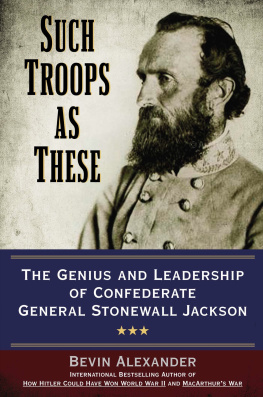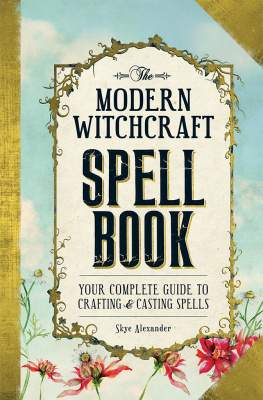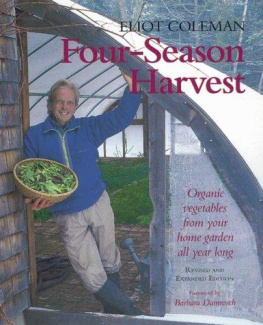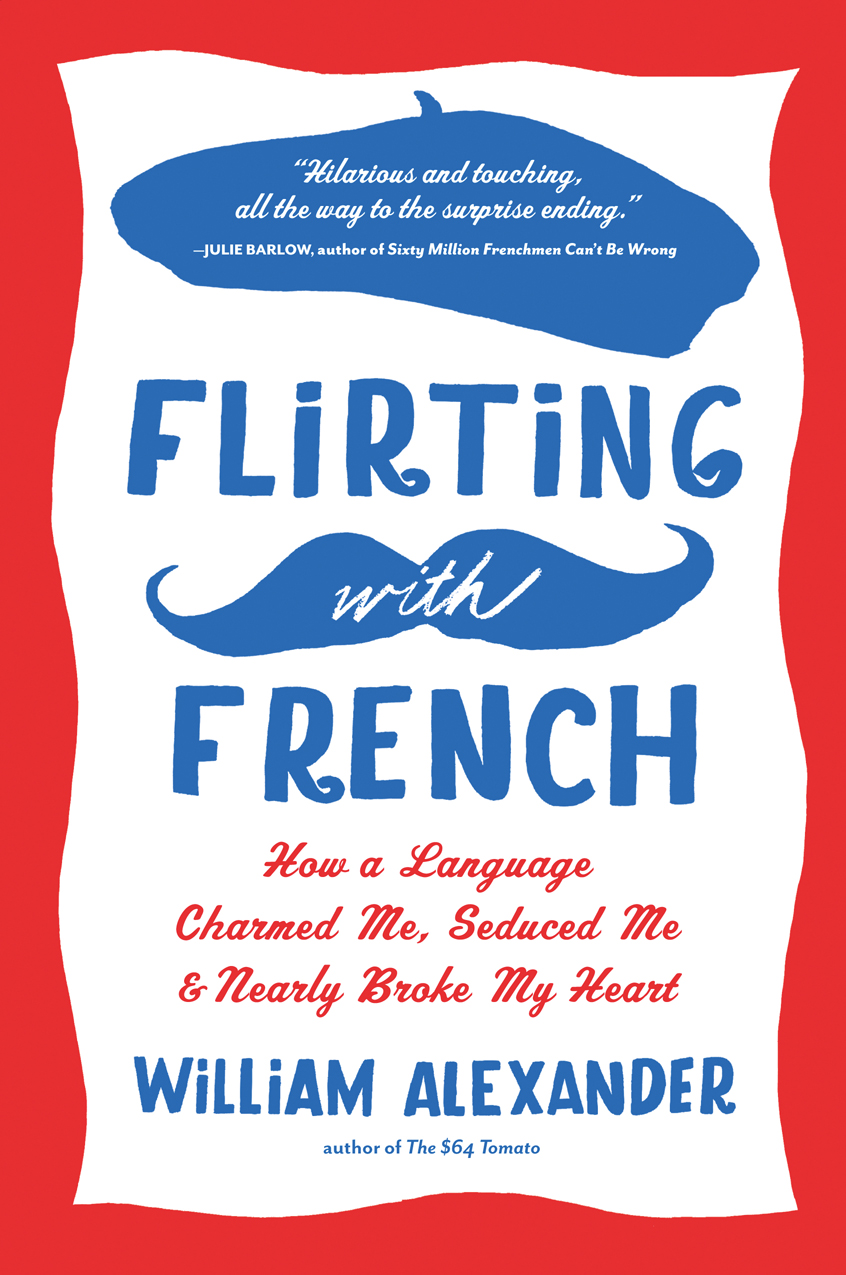FLIRTING
with
FRENCH
How a Language
Charmed Me, Seduced Me
& Nearly Broke My Heart
by WILLIAM ALEXANDER

ALGONQUIN BOOKS OF CHAPEL HILL 2014
Also by William Alexander
52 Loaves: A Half-Baked Adventure
The $64 Tomato: How One Man Nearly Lost His Sanity, Spent a Fortune, and Endured an Existential Crisis in the Quest for the Perfect Garden
For Guy
God was easier to understand than French.
SINGER PEFM BAILEY,
explaining why she dropped a French class to take up theology
Contents
La France, Mon Amour
French, for me, is not just an accomplishment. Its a need.
ALICE KAPLAN , French Lessons, 1994
Last night I dreamt I was French.
This mainly involved sipping absinthe at the window of a dark, chilly caf, wrapped in a long scarf that reached the floor, legs crossed, Camus in one hand and a hand-rolled cigarette in the other. I dont remember speaking French in the dream, and just as well, for in real life I once grandly pronounced in a Parisian restaurant, Ill have the ham in newspaper, and my son will have my daughter.
I love France. I have from the first time I stepped onto its soil as a twenty-two-year-old with nothing more than a backpack and a Eurail pass, and subsequent visits over thirty-five years have only fueled my passion. Whats to love?
A summer day along the Seine, the riverbank alive with groups of young people talking, singing, dancing, and sunning. Outrageously and playfully, the Seine has been transformed by Pariss popular socialist mayor into a city-long beach, complete with sprinklers and tons of sand.
Sitting at the counter of an astoundingly good restaurant alongside an elderly Frenchman and his white miniature poodle, for whom he has ordered a bifteck, rare. The server, who speaks no English, is practically begging me to order an off-the-menu special, which, as far as I can make out with my mostly forgotten high school French, is either young milk-fed pig or young pig marinated in milk, or both. The server prevails, and it is, as he knew it would be, the best meal I have ever eaten.
Traveling from the Mediterranean to Paris by train at 190 miles an hour, the window turned into a fast-motion scroll of medieval villages, farms, and pastures.
The owner-chef of a small village inn who, having just prepared and served us pigeon, rabbit, and foie gras, comes outside to help us clear an unexpected frost from our rental car windshield with the only tool available, her credit card.
The hush of dawn at a medieval monastery, for a magical ten minutes perhaps the most beautiful spot anywhere on earth, as the Norman mist vaporizes before my eyes, lifting its veil from rows of sunlit apple and pear trees, their ripe fruit awaiting the attention of a monks hands and a chefs knife.
A hole-in-the-wall Latin Quarter brasserie you wont find in any guidebook, whose waiter, a dead ringer for Teller (of Penn and Teller), skids around the sawdust-covered floor like Charlie Chaplin, balancing platters of saumon la crme with crispy pommes frites (fifteen dollars, dessert included).
A rainy afternoon with my wife at a Left Bank brasserie, watching the city scurry home, the drizzly streets an impressionist canvas come to life, Anne and I drunk on cold beer, on Paris, on love, happy as happy gets, neither of us speaking much, just enjoying the scene and realizing how lucky we are to love the same things, and Paris, and each other.
France does that to you.
Some Americans want to visit France. Some want to live in France. I want to be French. I have such an inexplicable affinity for all things French that I wonder if I was French in a former life (Id like to think Molire, but with my luck, more likely Robespierre, which explains that persistent crick in my neck). I love French music and movies. I yearn to play boules in a Provenal village square while discussing French politics. To retire to a little pied--terre in the city or a stone mas in the country. To get to know and understand the people who still worship Napoleon, who consider philosopher a job title, who can be both maddeningly rigid and movingly gracious, and who can send their children away at age fourteen to be apprentices.
Most of all, I yearn to bring soundspeechto that quiet caf of my dream. I cant be French if I dont speak French. Its time to stop yearning and start learning. True, at fifty-seven Im well into what is politely referred to as late middle age, and my goal of fluency in French wont come easily. But the way I look at it, next year Ill be fifty-eight, and it wont be any easier then. Cest la vie.
Stiff Job
Pickering: we have taken on a stiff job.
HENRY HIGGINS , on Eliza Doolittle, Pygmalion, 1912
There arent too many places where you can hear a joke like this while standing in line for coffee: So, Im lecturing my class last week. In the English language, I tell them, a double negative forms a positive. However, in some languages, such as Russian, a double negative remains a negative. But there isnt a single language, not one, in which a double positive can express a negative. And I hear a voice from the back of the room: Yeah, right.
Certainly Im not at Starbucks. This is the thirty-third annual Second Language Research Forum, or SLRF, which everyone here just calls slurf, at the University of Maryland. Ive come in the hope of getting some insight and advice for the task that I am about to tackle: learning Frenchbecoming fluent in Frenchat the age of fifty-seven. The opening speaker, Michael Long, a professor of second-language acquisition at the University of Maryland and the author of several books on the subject, has just told the 250 assembled linguists (although he seems to be looking directly at me) that only a tiny, tiny minority of postadolescent students will ever achieve near-native proficiency in a foreign language, and none will attain native proficiency. Long goes on to report in a matter-of-fact tone that the dimmest child will become far more proficient in his first language than the smartest adult in his second.
And Im not even the smartest adult.
When Long opens the floor to questions, a woman strides purposefully to the microphone. Speaking in crisp British English, she demands to know why the success stories of thousands of adults in India who have successfully acquired near-native English proficiency (a definition that includes speaking without an accent) is not written about.
Long replies with a lengthy, academic answer involving studies of young women in third-world tribal areas who, when married into other tribes, reportedly picked up the language of their new tribe with easestudies that, if confirmed, would make a mockery of all the perceived knowledge about second-language acquisition. Yet when we looked into this reported phenomenon, there was no empirical data, Long says. It was all subjective interpretation by the observers. So while I am sympathetic to your question, I have to say we need hard data before we can report on it.
This very unsympathetic reply infuriates the woman, who, while the rest of us heard Blah blah research blah blah data, heard Liar!
Well, I can tell you for a fact that this is happening, she shouts. I am the data! I am one of these people! Yet as far as you are concerned, I dont exist!
And I thought this conference was going to be dull. Although it never again approaches the emotional drama of the introductory session. Many of the talks I sit through over the next two and a half days, featuring such topics as Transfer Effects in the L2 Processing of Temporal Reference and Using Prosodic Information to Predict Sentence Length, are Greek to me. This is mainly owing to my unfamiliarity with the subject matter, but the difficulty is compounded by the fact that the speakers are given only twenty minutes to present forty minutes of material, meaning that they all race through their PowerPoint slides, speaking at twice the rate of normal speech. This, I comment to a young Chinese graduate student during a break, seems a touch ironic, considering that this is a gathering of linguists, who should know better. She says, Ironic? What does that mean?















